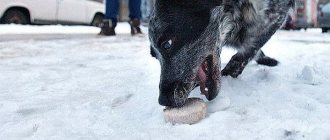Vomiting in dogs can be different, for example, your dog may throw up once, then don't worry, most likely it's because your pet is emptying his stomach. Many of you have noticed that sometimes dogs eat grass and then the grass tears up to “clean out the stomach,” as our grandmothers used to say.
In fact, dogs eat grass to relieve the feeling in their stomach. They, like people, may have weight, may have heartburn, all these “pleasant” feelings are not strangers to our four-legged friends. If the dog doesn’t “graze” all the time, there’s nothing wrong with that, it’s just that your pet’s stomach is in the way. If an animal eats grass constantly and vomits all the time, this may be a sign of a serious illness or infection of the pet with worms.
Very often, with this type of illness, the dog does not eat, and it breaks down. This is a sure sign of infection with worms, and in a developed form. If the dog breaks down, then you should be concerned and take action. First of all, you need to stop feeding the dog. Try to remember what your pet eats before you walk outside and what he ate while walking outside. Pay attention to the general condition of your pet; it may sound the alarm earlier; it also happens when you speak, but this does not mean that you are seriously ill.
Although, of course, in any case, the dog is vomiting
does not foretell anything good; at best, he can promise you to part with a certain amount of money that you will pay for examining your pet by a veterinarian, and at worst, serious health problems for dogs. But, let's go in order, let's start with the types of vomiting in dogs.
Dog vomits yellow
If a dog is vomiting yellow or yellow foam, it means the dog is vomiting bile. What does this mean and how can it be treated? There can be several reasons for vomiting. The first case we have already discussed is that a dog eats grass and vomits bile. As a rule, this procedure is performed in the morning on an empty stomach. After this vomiting, you need to monitor the dog and its condition. If the dog does not show signs of illness after vomiting bile (normal stool, the dog refuses to eat), then do not worry, this means that the dog is simply emptying its stomach and nothing is happening. But there may be another reason for vomiting, for example, the dog may have received improper nutrition and has excess bile in the body. In this case, the dog needs to be kept on a diet.
It is enough to stop feeding the dog during the day and its condition should return to normal. If the dog is vomiting yellow and the vomit is still worms, it means there is a problem with the dog. Sometimes there may be blood in the vomit, in which case you need to discard everything and take the dog to the clinic. Delay in such cases can cost your pet's life.
What to do if your dog is vomiting bile?
As we have already said, first of all the dog must keep him on a diet and monitor it. If the dog's health has improved and the vomiting of bile does not recur, there is no cause for concern if the vomiting recurs, then the dog should be seen by a doctor and treated. Very often, a dog's vomiting of bile can be helped by dietary changes.
Signs of other diseases
Vomiting with diarrhea is a sign of infection.
- The vomit smells like ammonia - the dog may have liver failure.
- The sweetish smell of vomit indicates diabetes in an animal.
- A putrid odor occurs when there are problems with the gastrointestinal tract and oral cavity.
- With stomach diseases, vomiting usually occurs some time after eating.
- Vomiting with diarrhea, high fever and refusal to eat is a sign of infection or poisoning.
- If a dog on a walk tries to find green grass and chew it, it may have stomach problems, and the grass helps cleanse it of excess contents. If such cleaning is not a systematic phenomenon, then there should be no worries about health. This is a natural stomach cleansing process for animals.
- Morning vomiting of yellow foamy contents indicates indigestion. This may be the first sign of pancreatitis.
Main symptoms of poisoning
Weakness is the main symptom of poisoning.
Signs indicating pet poisoning:
- Drooling, licking the face.
- Vomiting with diarrhea.
- Abdominal pain that is detected by palpation. The animal tries to dodge the touches and squeals in pain.
- Weakness, loss of coordination, unsteady gait.
- Muscle cramps or paralysis.
- With severe intoxication, the animal may lose consciousness or fall into a coma.
- Pesticide poisoning can be diagnosed by dilated pupils. In some cases, blindness is possible.
- The heart rhythm changes, breathing becomes more frequent or rare.
Dog vomits white foam
If a dog vomits white foam, there may be several reasons for such vomiting; in the first case, this vomit is completely safe. This happens if the dog has eaten, and a few hours after eating, all the contents of the stomach are pushed into the intestines, and the stomach remains empty. In this case, mucus remains in the stomach, which envelops the stomach after eating. It is this mucus that comes out with foam; the foam is formed when air enters the dog’s stomach.
In short, if a dog vomits white foam once, there is nothing wrong with it and don’t worry. But there is another side to the coin. A dog can constantly vomit white foam, the worst thing is when a dog vomits white foam on an empty stomach. If this happens, then the dog must be shown to a doctor, and before visiting the doctor, anti-worming medications should be given. Constant profuse vomiting of white foam may indicate severe contamination with worms.
When you don't need a veterinarian
The most common causes of nausea can be:
- binge eating;
- heatstroke;
- stressful situations.
Small puppies are often guilty of overeating: they do not feel full. If you don't remove your puppy's food, he will continue to eat until the food runs out or he vomits.
Heat stroke threatens a dog that is constantly exposed to the scorching rays of the sun if it has nowhere to hide from them - in the shade or shelter. In case of severe fright, a puppy or adult dog may begin to vomit. It will go away as soon as the animal calms down.
All these cases of short-term vomiting do not pose a particular threat to the animal: it will stop as soon as the cause that caused it is eliminated:
- Small puppies should be given food in doses, no more than what is recommended by regulations. If the pet has not finished the portion, it is better to remove it until the next feeding.
- An animal living in the yard should have a kennel or some other shelter where the dog can hide during the heat.
- If your pet is frightened, you need to calm it down as quickly as possible and take it away from the source of danger that caused the fright. Offer a dog who has burped a treat or toy, try giving him water to drink. As soon as the animal calms down, the urge will stop.
A small puppy that feeds on its mother's milk often burps after eating. Vomiting in a puppy is considered physiological and does not require veterinary intervention.
Dog vomits blood
If a dog is vomiting blood, then it is safe to say that your pet is ill. This vomiting can happen for a variety of reasons, but you should know that if your dog is vomiting blood, then he is bleeding internally. The reasons for this bleeding can be very different, for example, your dog swallowed a nail or a sharp piece of bone and hit him in the stomach with an object.
A dog may vomit blood as a result of poisoning from rat poison; this poison causes severe internal bleeding, which sometimes cannot be stopped, and the dog dies. Another reason for vomiting blood in dogs may be due to the fact that it has been taking antibiotics and other strong medications for a long time. In general, the causes of vomiting blood in dogs can vary greatly.
In such cases, of course, if the dog is vomiting blood, you need to see a doctor as quickly as possible. But, there are times when it is not possible to see a dog’s doctor, then you will have to act on your own.
So what should you do if your dog is vomiting blood?
Interesting question and answer too. Let's figure it out first stop feeding your pet.
During this period, about a day, the dog should not eat anything, you can only drink water and then in very small quantities. Be sure to give your dog two Kvamatel tablets. Just remember that the tablets should not be given at once, but one at a time. One tablet in the morning, the second in the evening. Make sure the dog is at rest, he stays where he wants, and moves less. If the cause of vomiting is a foreign object, the movement may cause increased internal bleeding and therefore recurrence of vomiting.
What to do
First of all, you should call a doctor. While he is driving, it is necessary to continue monitoring the animal and evaluate:
- frequency of urges;
- presence of other symptoms;
- appetite;
- the nature of the erupted masses.
The doctor will need to talk about the dog’s diet, its habits (primarily its tendency to pick up garbage), and contacts with other animals.
Since vomiting in any case leads to dehydration, it is necessary to provide the pet with the opportunity to replenish fluid loss. If he does not want to drink, water is forced into his mouth using a syringe. Never scold your dog for getting dirty in the house.
Before the doctor arrives, it is better for your pet to fast - eating food in this situation often leads to a worsening of the condition.
Treatment should be carried out only after an accurate diagnosis has been made; in a situation where this is impossible for any reason, symptomatic therapy must be started.
Dog vomiting water
When a dog drinks water and vomits, it may be the result of an infectious disease or intestinal disorder. This is one of the most dangerous types of vomiting, since when vomiting, the animal's body is severely dehydrated, and if the dog vomits water, it turns out that he cannot replenish fluid in the body. If your pet has these problems, then you should immediately consult a doctor, if this is not done, then your pet may just take a few days to die, usually death occurs within two days.
We looked at specific cases, but there are other causes of vomiting in dogs. For example, vomiting may be the first sign and symptom of distemper or rabies, the disease may be accompanied by severe vomiting and diarrhea, but the symptoms may be similar to ordinary poisoning, so it is certainly worth looking at the symptoms of diseases such as distemper or rabies.
This can save the life not only of your pet, but also of you. For example, distemper is not transmitted to humans, but anger is easily transmitted. If your pet gets rabies, it is believed that this will not happen, but if it bites, it may happen that your life is at risk.
Treatment
Treatment varies depending on what caused the symptom:
- Poisoning - a daily fast on water alone, a light diet of broths, cereals. If the animal is dehydrated, use a dropper; if it is severely poisoned, administer antidotes.
- Infection - antiviral drugs, antibiotics, hyperimmune serum.
- Inflammatory process - elimination of the root cause of the disease with antibiotics, immunostimulants, anti-inflammatory drugs, vitamin supplements.
- Intestinal obstruction - surgical intervention.
Specific medications:
- Against gastrointestinal spasms - “Papaverine”, “No-Shpa”.
- Anti-nausea - Cerucal.
- Against increased irritability of the stomach - “Omez”.
- In case of dehydration, intravenous glucose solution.
- To remove toxic substances - activated carbon, Smecta, Polysorb, Enterosgel.
- First aid - "Verakol".
Treatment at home is indicated only in the following cases:
- The dog vomited once.
- Vomiting of food was observed - without blood, mucus, foam, or bile.
- The animal's condition has not changed significantly - it eats well, plays well, and does not suffer from other symptoms.
Here's how you can help your dog:
- Delay the next meal for 12-24 hours, providing unlimited access to fresh water.
- After the hunger strike, offer the dog a light diet, soft, liquid food - pieces of boiled chicken without spices and salt, well-cooked rice, low-fat cottage cheese.
Main causes of vomiting in dogs
So, from the above we can deduce the main reasons why a dog may vomit. First of all, a dog may vomit due to improper or poor nutrition. This often happens if you feed your dog low quality dry food. Vomiting can occur due to spoiled foods; there is a popular belief that dogs can easily digest, but in fact this is far from the case. Further, another cause of vomiting may be a foreign body in the dog's esophagus or stomach. In this case, if vomiting is the body does not work, then only surgery can save your pet. Vomiting can also be caused by a viral disease in dogs, chemicals that the dog may eat while walking or a mistake at home, cancer, stomach ulcers, or hepatitis.
Also, a dog can get carsick, which can also lead to vomiting, and dogs can vomit due to extreme excitement, stress, and so on. Often an animal vomits due to a stomach or intestinal disease. Your dog may vomit after eating or while eating. This can happen if the dog's stomach is a foreign body, as we have already said. Sometimes a puppy may vomit due to overeating.
The puppy ate, ate a lot and densely, the food is not digested and comes back out. There is nothing wrong with this, it’s just that the puppy is regurgitating all the excess food, so if this happens, then there is no need to immediately run to the vet. If the situation repeats several times in a row, then of course it’s worth thinking about.
Ultimately, I would like to say that a dog vomiting is not always a sign of illness or something dangerous. If your pet is feeling well and suddenly pulls out, there is no need to worry right away. It may well be that in this case he must empty his stomach. If vomiting occurs once every few days, this is a signal to action. You urgently need to go to the doctor.
Diagnostics
The owner must inform the veterinarian of all the symptoms he observes. You need to remember whether your pet has suffered from any diseases of the gastrointestinal tract, and also whether he has eaten something “wrong” recently (for example). It is very important to remember exactly when the vomiting appeared, and after what exactly it happened.
The veterinarian will perform a complete examination of your pet. A complete urine sample is required, since the data obtained from this helps to identify severe diseases of the gastrointestinal tract.
As a rule, vomiting often accompanies many infectious diseases, which are quite accurately determined during the tests described above. If nothing can be reliably determined, the veterinarian resorts to x-ray and ultrasound examination of the abdominal cavity of the sick animal. It is important to note that before an X-ray examination, it is imperative to feed the dog barium gruel: this way, cases of gastrointestinal blockage, gastrointestinal atony, etc. can be easily identified. In addition, gastroendoscopy is indicated.
How to help
If the animal is sick from motion sickness or you suspect that such a nuisance may happen, give the dog a special remedy - Serenia - before leaving the house. This drug is sold in veterinary pharmacies.
All medications usually prescribed in this case are divided into two categories according to their mode of action.
The first includes agents that stimulate peristalsis. Thus, the consumed food actively moves through the intestines and cannot return in the form of vomiting. Such drugs are ideal for dogs prone to nausea, but are contraindicated in cases of poisoning by poor-quality food or chemicals. The most effective in this group is Metoclopramide.
Another group of medications acts directly on the brain center responsible for the gag reflex. They suppress its activity, and thus the urges are neutralized. The previously mentioned Serenia and Ondansetron also fall into this category.
If the vomit contains bile, it is necessary to begin complex therapy aimed at stabilizing the biliary system. It is worth understanding that such an animal must undergo diagnostics, without which it is impossible to accurately pinpoint the cause.
In any case, if signs of a pathological condition are detected, the dog is left without food for 24 hours. Then, for a speedy recovery, a strict diet is prescribed.
In general, inexperienced dog owners should know that in most cases it is possible to avoid vomiting if you do not treat your pet to the following harmful foods:
- sausage;
- smoked meats;
- fried.
Such dishes primarily irritate the mucous membranes of the stomach. In fact, bones are also harmful to dogs, especially boiled ones. The latter have zero nutrient content, and not every dog is able to digest them. In addition, they often cause constipation.
Both very cold and very hot foods are contraindicated for dogs.











